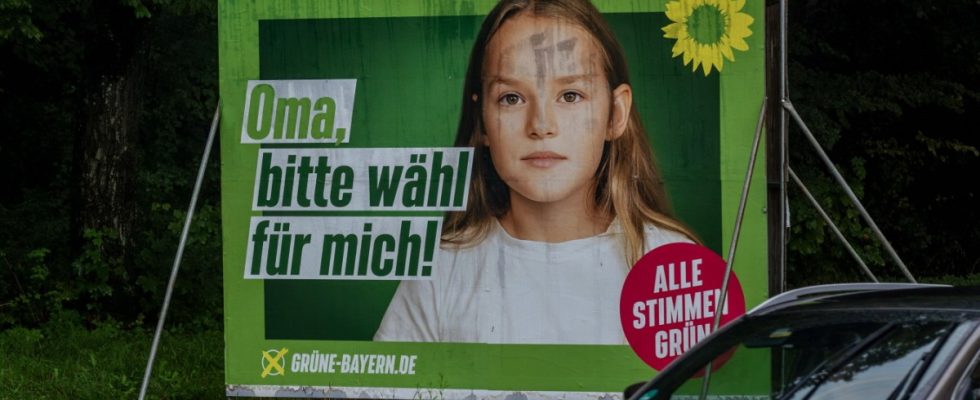Smaller, yes, but “undaunted” the new Green group will meet for the first time on Monday. In the Catholic Academy in Munich, not yet in the state parliament. Anyone who listens to the broad spectrum of the party these days will hear something like this: “no reason to lick wounds” or “nothing to do with your head in the sand.” That was also the story that the top candidates and parliamentary group leaders Katharina Schulze and Ludwig Hartmann spread on Monday at the first press conference after election night: The result – 14.4 percent, minus 3.2 points – may be “bitter”, but in view of a “significant shift to the right” it is also bitter for Bavaria. They meant the strengthening of the AfD in the Free State and apparently also of Hubert Aiwanger’s Free Voters. Ultimately, we were “firmly anchored”. And the loss of the unofficial title of the second strongest force, the opposition leadership in the state parliament? Hey, don’t feel sorry for yourself, let’s move on. That’s how it worked.
But no one doubts that internal analysis, critical analysis, is appropriate at the group’s three-day opening meeting. No shambles, no retreat from core positions. Schulze and Hartmann are also likely to be confirmed unchallenged at the top; in any case, there are no voices to the contrary. The two are the best-known faces of the Greens in Bavaria and were driving forces: Hartmann was king of the party in the center of Munich in the first votes, the Upper Bavarian list leader Schulze in the overall votes. On the other hand, one hears in party circles that there is obviously a “placement problem” in rural areas. Not that the topics or candidates were wrong – but under the massive pressure of the competitors’ attacks, they perhaps didn’t do enough to counter them, didn’t explain enough, and acted too “academic.” The election results and the composition of the new parliamentary group threaten to be perceived by the public as “a kind of Munich party”. The new parliamentary group must now definitely fight against this impression.
First, an inventory: The result brings 32 instead of 38 mandates, four of which were won directly in the state capital. Almost half of the MPs come from Upper Bavaria, namely 14. And ten of them come from the city and district of Munich alone. Several previous MPs who ran again failed to be reinstated. The most prominent is the state parliament vice-president Thomas Gehring from Allgäu. Christina Haubrich also no longer made it in Swabia, deputy parliamentary group leader Gisela Sengl in Upper Bavaria, Anna Schwamberger in Upper Palatinate and Elmar Heyn in Middle Franconia. To date and in the future, the Green Party state chairman Thomas von Sarnowski, 17th in Upper Bavaria, has no mandate, 14 came in.
There are four new faces in the parliamentary group: Andreas Birzele (Fürstenfeldbruck-Ost constituency), Mia Goller (Rottal-Inn), Julia Post (Munich-Pasing), Laura Weber (Weiden in der Oberpfalz). The proportion of women fell slightly to 46.8 percent. Paul Knoblach, 69, from Lower Franconia remains in the state parliament, he will be senior president and open the first plenary session. Helmut Markwort, 86, took on this role in 2018, but the FDP was thrown out of the state parliament. Florian Siekmann from Munich, 28, remains the youngest member of the Green Party – but this time there are younger colleagues in the state parliament, in the CSU and especially in the AfD parliamentary group.
The “slide to the right” diagnosed by the Greens, the traffic light trend, the dissatisfaction with the heating law, is that too short-sighted? A question that also came up behind closed doors in the party during the election campaign. The Greens are actually growing compared to 2018: more members, more local associations in the countryside, and new local councils in some places. This didn’t come through in the election. Since 2020, individual surveys have clearly shown the Greens at more than 20 percent. So there were times when more people in rural areas, for example in eastern Bavaria, could imagine a cross for the Greens. Now they have achieved single-digit results in Lower Bavaria and Upper Palatinate.
In the group’s work so far, there is sufficient feeling for the country and the important issues, for all ideas and concepts, according to the party. But not infrequently “too detailed” in action plans or ten-point programs. It may be that in the future we will have to “get out there with content more easily”, despite our “favor for facts”. Although that probably wouldn’t have helped in this election campaign against the ban party’s “constructed distorted images” – for example when it comes to eating, driving a car, owning a home. However, an urban-rural debate within the party or parliamentary group is not to be expected. Rather, the view that dominates is: Luckily there is Munich’s strength, which made the still acceptable result possible.

